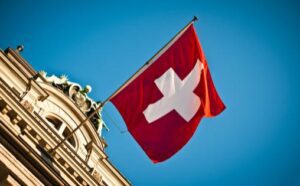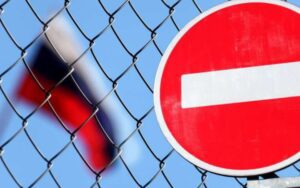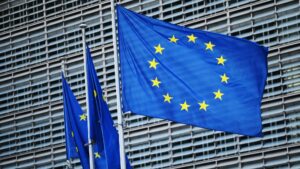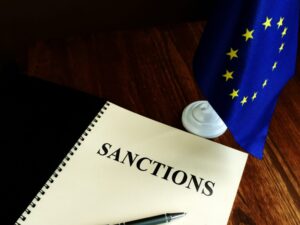
Ukrainian President Vladimir Zelensky on Sunday signed a decree enacting a decision of the National Security and Defense Council of Ukraine to impose personal sanctions against 198 Russian propagandists and talk show participants on Russian channels, as well as other figures in the Russian media sphere.
The corresponding document #23/2023 was published on the website of the head of state.
“To enact the decision of the National Security and Defense Council of Ukraine dated January 15, 2023 “On the application and amendment of personal special economic and other restrictive measures (sanctions),” the decree reads.
The decision of the National Security and Defense Council is attached to the decree. It contains a list of 198 people of Russian culture and the media sphere, against whom personal sanctions are imposed.
The list includes, among others, Russian blogger, translator and publicist Dmitry Puchkov (Goblin), politician Sergei Stankevich, general producer of Russian propaganda television channel “Zvezda,” Boris Yanovsky, TV presenter Yana Rudkovskaya, actor and TV presenter Boris Korchevnikov, Russian music critic and journalist Sergei Sosedov, sociologist Yevgeny Kopatko, political scientist Rostislav Ishchenko, Rodion Miroshnik, publicist and propagandist Vladimir Kornilov, sports journalist Dmitry Guberniev, film director Andrei Konchalovsky, and other propagandists from Russian central TV channels, as well as so-called Russian “war correspondents.
Diana Panchenko, a former Ukrainian TV anchorwoman who now shoots propaganda clips for Russian television in the temporarily occupied territories of Ukraine, was also put on the list.
A full package of personal sanctions for a period of 10 years is being imposed against those on the list.
“This decree shall enter into force on the day of its publication,” the document signed by the president reads.

Switzerland followed the EU in imposing new sanctions against Russia, with 141 individuals and 49 legal entities added to the “black lists,” the Swiss government said in a statement.
“Switzerland, by amending the sanctions lists on December 21, thus joined the EU measures,” the press release said.
“Switzerland is amending the sanctions regime as part of the measures that the EU adopted in connection with the supply of Iranian drones to Russia and the continuing alarming situation in Ukraine,” the document specified.
The sanctions will take effect at 6 p.m. local time.
According to the statement, on December 16, the EU also imposed a ban on exports to Russia of a number of other categories of goods and services, and the Swiss government, in turn, will study these measures.
On December 16, the EU Council approved the ninth package of sanctions against Russia, which includes restrictions against the mining and energy sectors and a ban on exports of space industry goods and drones.
Among other things, the EU also added 168 more entities related to the defense industry of Russia to its “black lists. In addition, the ninth EU sanctions package against Russia included 144 individuals, including high-ranking Russian officials, MPs, military personnel and artists from Russia.

The ninth package of European Union sanctions on Russia for the war it is waging against Ukraine will be approved in writing on Friday.
The Czech Presidency announced this on its Twitter page.
“Ambassadors agreed in principle on a sanctions package against Russia as part of the EU’s ongoing support for Ukraine. The third Russia sanctions package negotiated under the Czech Presidency of the Council of the European Union should be confirmed via written procedure tomorrow,” it said.
In accordance with the practice of the EU, initially the decisions that must be further approved by the leaders of the EU are agreed upon at the level of ambassadors of the EU member states. So in this case, before the leaders approved the ninth package of sanctions for Russia, they were agreed upon by the ambassadors, whose Committee meetings were held almost simultaneously with the meeting of the European Council.

The European Commission on Wednesday proposed to introduce another – ninth – package of sanctions against Russia, which should include a ban on transactions with three Russian banks and other measures.
According to a statement from EC Chairwoman Ursula von der Leyen, the EU executive body proposes as part of the new package of measures to include about 200 more individuals in the sanctions lists, to introduce a ban on transactions with three Russian banks, including the All-Russian Bank of Regions Development, as well as the broadcasting of four Russian media channels.
Von der Leyen’s proposals also include a ban on the export of unmanned aerial vehicles to Russia. In addition, the EC wants to impose new export restrictions, in particular on dual-use goods – “key chemicals, neuroparalytic substances, electronics and IT components.

Switzerland on Wednesday approved the eighth package of sanctions against Russia, which includes the introduction of a “ceiling” on Russian oil prices.
“The Swiss Federal Council adopted another set of sanctions against Russia on November 23. The council approved the measures adopted by the European Union as part of the eighth sanctions package,” the document published on the Federal Council’s website reads.
“The sanctions include a legal basis for imposing a ‘ceiling’ on prices of Russian oil and oil products, as well as restrictions on iron and steel goods, aerospace products and goods of economic importance to Russia,” the statement stressed.
It is specified that the sanctions will take effect at 18:00 Wednesday local time (19:00 KSC).
The new measures also include a ban on the provision of IT, engineering, architectural and legal services to the Russian authorities and companies. In addition, a ban is introduced for citizens of Switzerland to occupy managerial positions in some companies owned by Russia.
The document notes that on October 12, the Swiss authorities added 30 more individuals and entities to the sanctions list for Russia.
The EU adopted the eighth package of sanctions with similar measures on October 6 in response to Russia’s escalation of military aggression against Ukraine.

The United States, in contacts with the EU countries, put forward a proposal to apply the experience gained from the implementation of the export control regime in relation to the Russian Federation against China, Bloomberg reported on Monday, citing a number of anonymous sources.
“The United States, in contacts with European allies, has voiced the idea of learning from the export control regime used against Russia to fight China, according to people familiar with the matter,” the agency said.
The White House is “exploring some elements of similar information sharing and coordination in implementing measures to tighten US and EU restrictions” on exports to China, the sources said.
Such discussions come at a time when the EU and the US are discussing the agenda for the third meeting of the Trade and Technology Council scheduled for December 5, which serves as a forum for coordinating trade and technology policy between the EU and the US.
However, the sources note, the EU is not inclined to consider applying to the PRC the same approach that was used in relation to Russia. According to one source, the EU may look at the goods that Beijing is able to use to increase its military capabilities.
In turn, the US National Security Council denied plans to extend the export control regime against the Russian Federation to China, and the fact of discussions on this topic with European countries.
Bloomberg explains that export restrictions are considered potentially effective in slowing down China’s development amid global competition for technological supremacy.
On October 7, the US Department of Commerce banned the sale to China of the most advanced chips, as well as equipment, components and software for their production, with a special focus on technologies related to artificial intelligence and potential military applications. The restrictions affected the exports of other countries, which depend on similar American technologies and programs. Also, US citizens were forbidden to advise the Chinese side or provide it with other services in this area.
Subsequently, US Deputy Secretary of Commerce for Industry and Security Alan Estevez said that Washington expects an early agreement with the allies on their accession to these restrictions. However, authorities in the Netherlands, home of ASML Holding, a manufacturing equipment for the electronics industry, have expressed concern about the effect of new US restrictive measures.
Meanwhile, in mid-October, The Financial Times reported, citing an EU foreign policy document prepared for a meeting of the EU Foreign Affairs Council, that, in its opinion, China is a competitor that needs to be confronted, and that policy towards China should be tightened. A number of EU leaders later also warned against economic dependence on China.